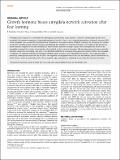Growth hormone biases amygdala network activation after fear learning
Author(s)
Gisabella, Barbara; Farah, Shadia; Peng, Xiaoyu; Burgos-Robles, Anthony Noel; Lim, Seh Hong; Goosens, Ki Ann; ... Show more Show less
DownloadGisabella-2016-Growth hormone biases amygdala.pdf (1.571Mb)
PUBLISHER_CC
Publisher with Creative Commons License
Creative Commons Attribution
Terms of use
Metadata
Show full item recordAbstract
Prolonged stress exposure is a risk factor for developing posttraumatic stress disorder, a disorder characterized by the ‘over-encoding’ of a traumatic experience. A potential mechanism by which this occurs is through upregulation of growth hormone (GH) in the amygdala. Here we test the hypotheses that GH promotes the over-encoding of fearful memories by increasing the number of neurons activated during memory encoding and biasing the allocation of neuronal activation, one aspect of the process by which neurons compete to encode memories, to favor neurons that have stronger inputs. Viral overexpression of GH in the amygdala increased the number of amygdala cells activated by fear memory formation. GH-overexpressing cells were especially biased to express the immediate early gene c-Fos after fear conditioning, revealing strong autocrine actions of GH in the amygdala. In addition, we observed dramatically enhanced dendritic spine density in GH-overexpressing neurons. These data elucidate a previously unrecognized autocrine role for GH in the regulation of amygdala neuron function and identify specific mechanisms by which chronic stress, by enhancing GH in the amygdala, may predispose an individual to excessive fear memory formation.
Date issued
2016-07Department
Massachusetts Institute of Technology. Department of Brain and Cognitive Sciences; McGovern Institute for Brain Research at MIT; Picower Institute for Learning and MemoryJournal
Translational Psychiatry
Publisher
Springer Nature
Citation
Gisabella, B., S. Farah, X. Peng, A. Burgos-Robles, S. H. Lim, and K. A. Goosens. “Growth Hormone Biases Amygdala Network Activation after Fear Learning.” Translational Psychiatry 6, no. 11 (November 29, 2016): e960.
Version: Final published version
ISSN
2158-3188